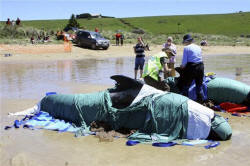 |
Other
News... sponsored by Richardson Repair & A-Plus Flooring |

 150 whales die in stranding in Australia
150 whales die in stranding in Australia
[December 01, 2008]
HOBART, Australia (AP)
--
Officials from Tasmania state's Parks and Wildlife Service rushed Sunday in four-wheel-drive vehicles to the remote site at Sandy Cape after the long-finned pilot whales were spotted by air a day earlier.
|
A helicopter crew that arrived late Saturday found about a dozen of the whales injured but alive, said Warwick Brennan, a spokesman for the service. Other officials and volunteers arrived by four-wheel-drive vehicle on Sunday and worked frantically to save those remaining, but they died, Brennan said. The coastline is strewn with reefs and jagged rocks, making it much more dangerous for the stranded whales than if they had landed at a sandy beach, said Rosemary Gales, another wildlife service official. "Because of the physical beating they take from stranding on rocks and surf, compared to sandy beach strandings, animals die more quickly," said Gales. Officials in small boats steered about 30 whales that were part of the same pod as those stranded away from the bay where they went ashore. They were apparently responding to cries of distress from an injured whale and were in danger of becoming stuck too, Brennan said. The operation comes one week after rescuers saved 11 pilot whales among more than 60 stranded on a beach in northwestern Tasmania, which is an island. Strandings are not uncommon in Tasmania, where the whales pass by on their migration to and from Antarctic waters. It is not known why whales get stranded. |

